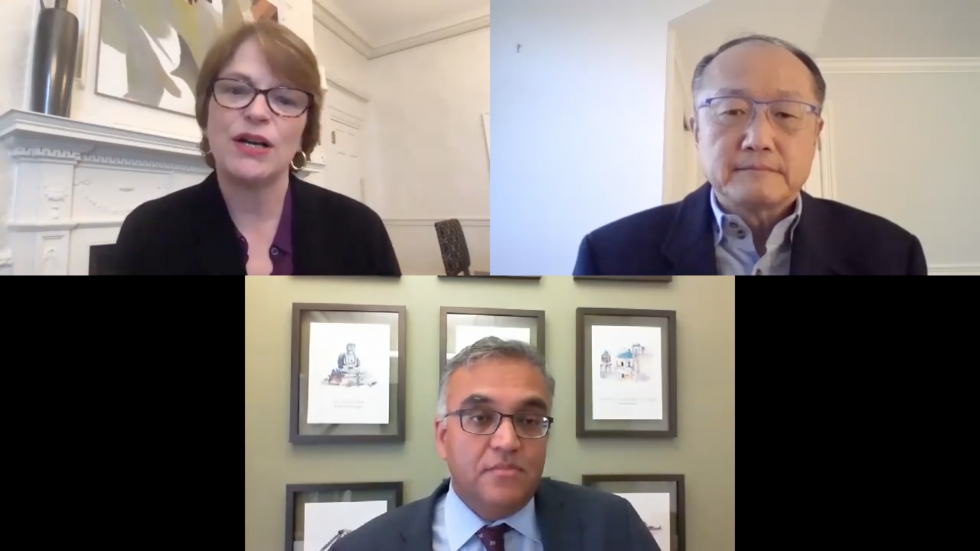PROVIDENCE, R.I. [Brown University] — As the United States becomes the epicenter of the COVID-19 pandemic, Americans find themselves confronting growing unease and more questions than answers: When will this crisis end? Do hospitals have enough supplies? How do we stay hopeful?
In the first segment of a new virtual discussion series titled “Community Conversations” and hosted by Brown University President Christina H. Paxson, two global health leaders who are part of the Brown community joined Paxson via video conference to address those questions and discuss strategies for ending the outbreak.
Dr. Jim Yong Kim, a Brown Class of 1982 alumnus and senior fellow at the Watson Institute of International and Public Affairs, has a long history as a physician, scholar, educator and global health advocate. Kim co-founded Partners in Health, directed the HIV/AIDS division of the World Health Organization, was president of both the World Bank and of Dartmouth College, and is currently a partner at Global Infrastructure Partners.
In a far-ranging conversation that covered the implications of COVID-19 on everything from higher education to the global economy, Kim said that for the U.S., a national strategy akin to that of South Korea — extensive COVID-19 testing and contract tracing coupled with aggressive measures to isolate, support and treat diagnosed patients — will be essential in bringing the outbreak under control.
He called for increased federal investment in addressing the public health element of the crisis beyond the direct economic support the U.S. has pledged for most households.
“This is not an economic crisis,” Kim said. “Because this is fundamentally a public health problem, we need to put whatever it takes to solve the public health problem, or we’re never going to get economies up and running.”
Dr. Ashish Jha, a physician and scholar who directs the Global Health Institute at Harvard University and will begin his tenure as dean of Brown’s School of Public Health this fall, said that elected and health care leaders have yet to be bold enough in their response. The wide disruption to daily life in the U.S. means that Americans have an appetite for aggressive action, he said, with aggressive government investment where needed.
“If there was ever a case to be made that we need to go big on public health, it is now and for the next 12 to 18 months,” Jha said. “Then to reset the entire conversation about where public health belongs on our national policy agenda, because we’ve seen the impact of not prioritizing public health.”
The full conversation is available on YouTube. The next Community Conversations event is scheduled for Tuesday, April 7, at noon. Greg Mankiw, a professor of economics at Harvard and former chairman of the Council of Economic Advisers, will join Paxson (also an accomplished economist) to discuss the economic impact of the COVID-19 pandemic.
